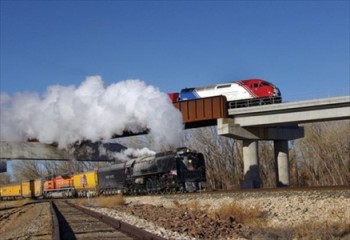
This composite photo was published on the Standard-Examiner's Nov. 27 front page. The newspaper apologized in a Dec. 17 column from its executive editor. (Credit: The Standard-Examiner, James Parks, screenshot)
The Standard-Examiner’s executive editor Andy Howell apologized in a Dec. 17 column for publishing a photoshopped train photo on its front page Nov. 27.
According to Howell’s column, the fake image pictured a “commuter train passing over Union Pacific steam engine No. 844 as both approached Ogden,” Utah. The Standard-Examiner is a daily newspaper in Ogden, Utah with a circulation of about 62,000 copies, according to Mondo Times.
Howell called the newspaper’s fake photo publishing a “news deception that goes against the principles of photojournalism.” He explained that the phony photo turned out to be a composite photo of two pictures of real events taken ten minutes apart. He noted the newspaper didn’t know it was a composite photo upon publication, and that if it had, it likely would have disclosed that the image was an illustration.
The composite image was “submitted by a trusted contributor,” James Parks, and significant because it “captured the past and present of the evolution of the locomotive in American society” with the newer train moving past the older locomotive “delivered in 1944.” However, Howell defended Parks, saying that he was unaware of photo ethics guidelines barring photoshop and composite photos without disclosure. As Howell explained, “To him, combining the photos was just a way of telling the story.” Further, Howell noted the newspaper never asked Parks about any photoshop in the photo.
Parks told the Standard-Examiner: “I did not think I was doing anything against the rules.” See here and here the two images that Parks put together to make this final product.
According to Howell, Parks ended up contacting the newspaper and clarifying that the image was a composite after he continued to receive praise for the image from friends and the newspaper’s visuals editor.
Howell argued that Parks wasn’t purposely trying to deceive the newspaper and that journalists should “do a better job of educating the public as to the role and ethics of journalism if we want them to be regular contributors.”
According to a search of the Standard-Examiner’s website and story comments, this story appears to have accompanied the photo. While the search function indicates the story was published Nov. 27 (when the photo was published), the date on the story now reads Dec. 14. We have written to Howell asking for confirmation that this is the story in question and asking if the Standard-Examiner will be adding a note or link to his column explaining why the photo has been taken down.
Howell confirmed via e-mail that this is the story in question. He told us the newspaper did take down the photo in question (except for the photo to accompany his column on the matter).
The Standard-Examiner “will no longer use [Parks’] contribution,” Howell told iMediaEthics by e-mail. He noted that Parks’ “stories and photos” used by the newspaper were related to Ogden and its “rich railroad history.” Parks is “a longtime resident and unofficial railroad historian,” according to Howell.
We asked Howell how the newspaper will “do a better job educating the public” in order to avoid future incidents like this. He told us by e-mail that “I hope to use my column to better foster discussion and education relating to this topic. We will also post or link to the SPJ ethics with our callouts for photo contributions.” According to Howell, the newspaper’s journalists subscribe to the Society of Professional Journalists’ ethics code.
We also asked Howell if the newspaper will start asking more questions about submissions or call on freelancers to review an ethics or standards code. Howell told us: “Most of our paid freelancers are regular contributors we call correspondents. Many have journalism backgrounds. We require them to submit resumes and go over ethical expectations with them before bringing them on. When considering unpaid content we will try to use more due diligence in asking the contributor about how he got the photo or sources.”
UPDATE: 12/17/2011 12:38 PM EST: Updated with Howell’s response to iMediaEthics’ e-mail inquiry.






